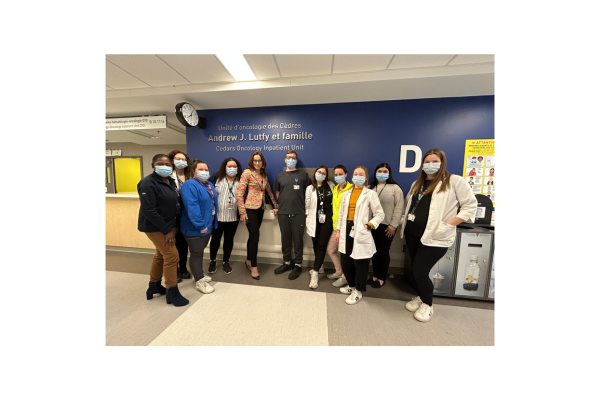Long hospital stays are no longer the only option for stem cell transplant patients at the MUHC
Imagine receiving a lifesaving procedure without needing to be hospitalized? This is now a reality at the MUHC – thanks to the opening of the Hemato-Onco Day Hospital.
For the first time, a patient diagnosed with multiple myeloma (plasma cell cancer) received an “autologous” stem cell transplant as an outpatient, avoiding a long hospital stay that could run up to three weeks.
Patient treatment includes chemotherapy a few days prior to the procedure, followed by a few hours of observation, then cell infusion two days after - if all goes well, the patient is discharged home that same day. Daily check-ins happen in person and/or by phone. “If there are no complications, the patient won’t need to be admitted or visit the emergency room,” says Christine Bouchard, Associate Director, Cancer Care Mission. “This new process enables patients to stay in the comfort of their home with their loved ones. We know this is an important part of patient recovery and leads to better outcomes by reducing the risk of infection while hospitalized.” This project is implemented on D10 South, with plans to transfer to Ambulatory Oncology Services.
“We are looking into providing this care and service option to more patients for other treatment indications, always ensuring that patient safety is maintained, and the necessary home support is in place. It’s an exciting new development in our cancer care mission,” states Dr. Gizelle Popradi, Director, Stem Cell Transplant Program/Clinical Teaching Unit Director, Hematology and Transplant, Hematologist at the MUHC.
Christine congratulates the team on D10 for their exceptional work to get this program up and running. “This initiative is possible due to the cooperation and collaboration of various departments, including, nursing, clinicians, pharmacy, stem cell lab, OACIS, medical archives, Stem Cell Transplant Quality Assurance team, and of course the support from senior leadership.”

The success of this program represents a promising advancement in reducing lengthy hospital stays for other patients needing cancer treatment and care on D10.
